A Guide to Organic Lawn Fertilizer
BY TAHA JAVED | JULY 27TH, 2023 | BLOGOrganic lawn fertilizers are a natural and sustainable way to nourish your lawn while causing the least environmental harm. These fertilizers give essential nutrients to the soil by utilizing organic materials and natural substances, fostering healthy development and sparkling green grass.
What are Organic Fertilizers?
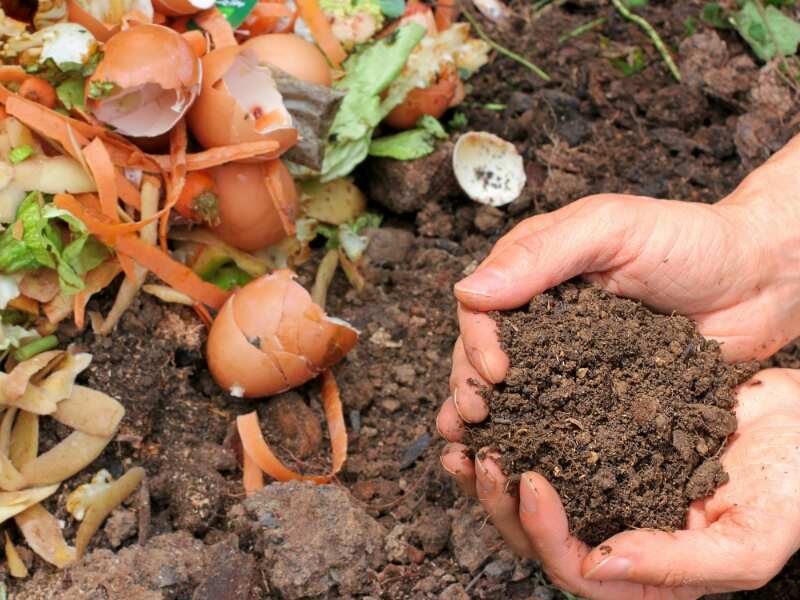
Photo Credit: melGreenFR from Pixabay / Canva Pro / License
Organic fertilizers are derived from natural sources and are minimally processed. They are often made up of plant material, animal byproducts, or mineral deposits. These materials decompose or compost, producing nutrient-rich substances that can be applied to lawns and gardens to offer necessary nourishment.
Compost, animal manure, bone meal, blood meal, fish emulsion, broken shell, and kelp meal are all examples of organic fertilizers. Because of their natural composition and slow-release nature, they provide a more balanced and environmentally conscientious approach to lawn care.
What to Look for in the Best Organic Lawn Fertilizer
There are a few essential things to consider while looking for organic fertilizers for your lawn, including:
- Organic certification: First, look for organic certification to guarantee that the product meets strict organic standards. One place to check for certification is the Organic Materials Research Institute (OMRI) website.
- Nutrients: Next, consider the nutrient composition, as different grass types and soil conditions have different nutrient needs. Identify your grass type and test your soil to find out what nutrients your lawn needs in an organic fertilizer.
- Slow-release formula: Look for slow-release formulas that feed nutrients to the grass gradually, lowering the risk of burning and fostering long-term development. Most organic lawn fertilizers are slow-release by nature.
- Microbial health: Consider fertilizers that have microbial additives that improve soil health. The tiny microbes living in your soil are more important for healthy grass growth than you probably think!
- Pet- and kid-friendly: Though all organic fertilizers are less dangerous than harsh chemicals, some may not be safe to apply in spaces where pets or children play. Check product labels to find out if they are pet- and kid-friendly.
Considering these aspects, you can choose the best organic fertilizer for your lawn and create a healthy, vibrant, and environmentally friendly landscape. You can also get assistance from our guide on choosing lawn fertilizer to make the right choice for your lawn.
Organic Fertilizers vs. Synthetic Fertilizers
Organic fertilizers and synthetic fertilizers both have pros and cons, but how do they stack up against each other? Take a look at our comparison.
| Pros of Organic Fertilizer | Pros of Synthetic Fertilizer |
| ✓ Slow-release for longer-lasting, more consistent results ✓ Improves soil composition and microbial health ✓ Don’t pollute the soil or local bodies of water ✓ Fewer health risks than synthetic chemicals | ✓ Immediate release for faster results and quick green-up ✓ Formulated with specific nutrient formulations to compensate for individual soil deficiencies ✓ More affordable than organic options |
| Cons of Organic Fertilizer | Cons of Synthetic Fertilizer |
| ✗ Takes longer to see results ✗ More expensive than synthetic fertilizers | ✗ More likely to cause fertilizer burn or lead to nutrient imbalances ✗ Can harm beneficial microorganisms in the soil ✗ Runoff contributes to water pollution ✗ Results don’t last as long, so more frequent applications are necessary ✗ More dangerous for pets and children who might accidentally consume harmful chemicals |
Organic fertilizers use natural processes to slowly release nutrients and promote soil health gradually. On the other hand, synthetic fertilizers are manufactured chemically, containing concentrated amounts of specific nutrients quickly released into your soil.
Synthetic fertilizers provide rapid nutrient availability to plants but can also lead to nutrient imbalances, leach into bodies of water, and cause soil degradation. These fertilizers have the potential to harm beneficial soil organisms and contribute to water pollution, whereas organic fertilizers improve the soil’s structure, moisture retention, and nutrient cycling.
Organic fertilizers are comparatively more expensive than traditional chemical fertilizers and may take longer to give you results. But their long-term benefits and lower environmental impact make them an excellent choice for environmentally conscious homeowners.
Benefits of Organic Lawn Fertilizer
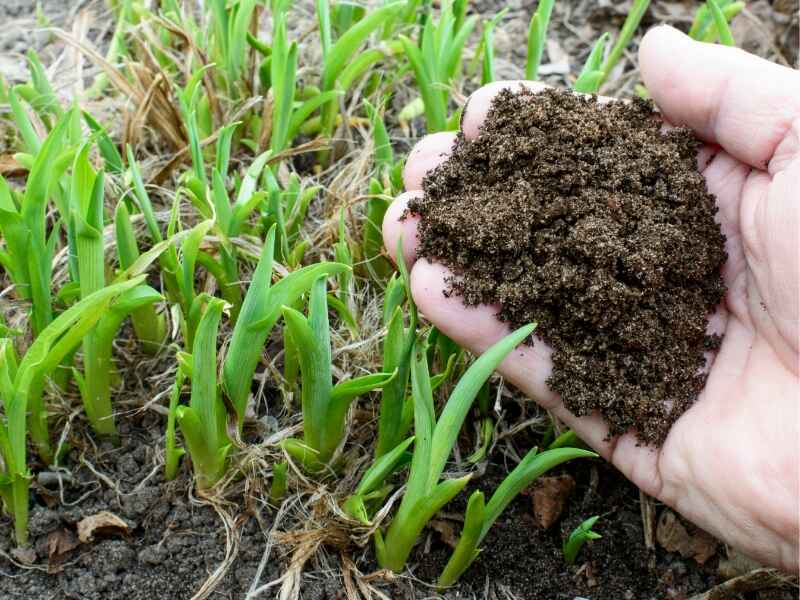
Photo Credit: schulzie / Canva Pro / License
Organic lawn fertilizers provide multiple benefits, making them an appealing alternative for ecologically conscious lawn owners. Let’s examine the benefits of using organic fertilizers and why going natural is the best option.
- Environmental Friendliness: Organic fertilizers are sourced from natural ingredients. Adopting organic alternatives reduces the chance of introducing toxic compounds into the soil, groundwater, and neighboring ecosystems. This environmentally friendly strategy aids in the preservation of biodiversity, the protection of beneficial insects, and the promotion of a healthy environment for all living species.
- Enhancement of Soil Health: Organic fertilizers are rich in organic matter. When applied to the soil, they increase the soil’s organic content. Organic matter improves soil structure by binding soil particles together, creating aggregates for better water infiltration and air circulation. It also enhances the soil’s ability to retain moisture, reducing the risk of drought stress on your grass.
- Encouragement of Beneficial Microbes: Organic fertilizers foster a thriving microbial community in the soil. Beneficial microorganisms, such as bacteria, fungi, and earthworms, break down organic matter, releasing nutrients in forms that plants can readily absorb. These microorganisms also help decompose organic residues, improve nutrient availability, and contribute to soil health and fertility. They form symbiotic relationships with plants, assisting nutrient uptake and disease suppression.
- Long-term Sustainability: Organic lawn fertilizers function in harmony with the natural cycles of your grass and the surrounding ecosystem. They deliver a continuous flow of nutrients by slowly releasing them, ensuring that your grass receives consistent nourishment over time. It reduces the need for regular application of fertilizers and allows you to keep your grass lush and vibrant with less effort.
- Pet and Family Safety: Organic fertilizers are generally safer because they are made from natural substances less likely to cause harm. Using them eliminates worries about chemical residues on your lawn, giving you peace of mind and a safer environment for your children and pets to play in.
- Nutrient-rich Lawn: Organic fertilizers provide a well-balanced mix of key nutrients such as nitrogen, phosphorus, and potassium, all necessary for plant growth. Furthermore, they often include trace minerals and micronutrients that help your lawn’s general health and resiliency.
What is NPK Ratio for Organic Fertilizers?
Organic lawn fertilizers have varying NPK ratios, representing the percentage of nitrogen (N; encourages leaf growth), phosphorus (P; stimulates root development), and potassium (K; fortifies plant cells and increases disease resistance) they contain. Here are some common NPK ratios you may encounter with organic fertilizers:
- Balanced Ratio: A balanced ratio, such as 10-10-10 or 8-8-8, means that the fertilizer contains equal proportions of nitrogen, phosphorus, and potassium. This fertilizer is suitable for maintaining overall lawn health without focusing on specific needs.
- High Nitrogen Ratio: Fertilizers with higher nitrogen ratios, like 20-5-10 or 16-4-8, are designed to promote lush, green growth. They are suitable for lawns that require a boost in vegetative growth, such as in the early spring, or for recovering from stress or damage.
- High Phosphorus Ratio: Fertilizers with higher phosphorus ratios, such as 10-20-10 or 8-16-8, promote root development, flowering, and fruiting. They are often used when establishing new lawns or to enhance the establishment of grassroots and overall plant growth. However, high-phosphorous fertilizers are not the most eco-friendly because their runoff can cause algae blooms in local bodies of water, which disrupt natural ecosystems. Phosphorus fertilizers are even banned in some states.
- High Potassium Ratio: Fertilizers with higher potassium ratios, like 10-5-20 or 8-4-16, help improve overall plant health, disease resistance, and stress tolerance. They are commonly applied in preparation for winter or during times of drought or heat stress.
Consider your lawn’s nutrient requirements when selecting an organic fertilizer, and choose a product with a suitable NPK ratio.
Just remember that organic fertilizers have lower ratios than synthetic ones because they release nutrients slowly. Understanding the NPK ratio enables you to provide the proper nutrient balance, resulting in a lush and vibrant lawn.
Application of Organic Fertilizer
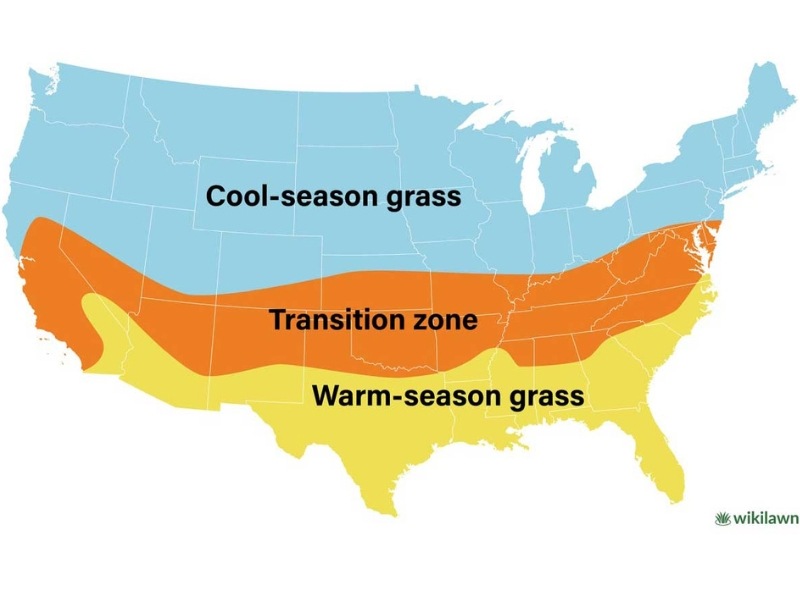
Infographic by Juan Rodriguez
When it comes to applying organic fertilizer, appropriate techniques and timing are essential. Fertilizers are best used in one to two applications for a healthy lawn, but timing differs for cool-season grass and warm-season grass.
- Fall is the best time to apply organic fertilizer to your lawn for cool-season grasses because it is the grass’s growth season. But if you want to go for a second application, spring is also ideal when the grass greens up after winter dormancy.
- For warm-season grasses, mid-spring through summer is the ideal time to fertilize your lawn.
Learn more about the timing of fertilization for different grass types with our ideal lawn fertilizer schedule.
Combine organic fertilizer application with proper lawn care procedures for the best results. Mow your lawn at the appropriate height regularly, water it properly, and deal with any weed or pest problems as soon as possible. Follow our detailed guide on when and how to fertilize your lawn to do it correctly.
Best Organic Lawn Care Practices
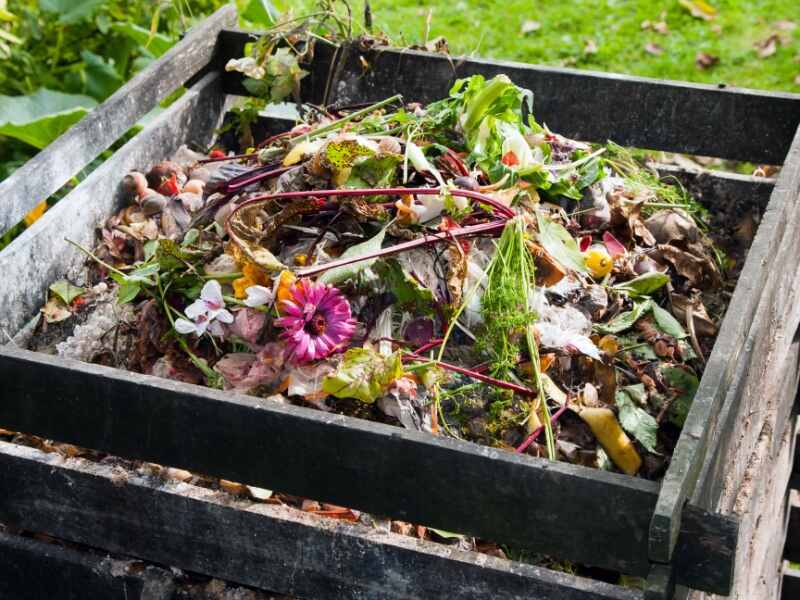
Photo Credit: piotr_malczyk / Canva Pro / License
Before diving into the best organic lawn care practices, let’s get familiar with organic lawn care. Organic lawn care refers to maintaining a healthy green lawn using natural and environmentally friendly methods. It involves avoiding chemicals, such as synthetic fertilizers, herbicides, and pesticides, and instead focusing on organic alternatives.
Popular organic lawn care practices to use in tandem with organic lawn fertilizers include:
Growing the Right Grass for Your Climate
Grow the grasses that thrive in your locality without competition. For instance, cool-season grass is better for regions with cold winters and mild summers, while warm-season grass is better for regions with hot summers and mild winters.
For an even lower maintenance and more eco-friendly lawn, ditch traditional turfgrasses altogether and plant native grasses from your region, such as switchgrass, blue grama, buffalograss, or bushy bluestem. Native grasses thrive with less irrigation, fertilizer, herbicide, and pesticide, which is better for your schedule, your wallet, and the environment.
Composting
Embrace the power of composting by creating your own compost out of kitchen scraps or purchasing organic compost. Apply a light layer of compost to your lawn yearly to strengthen the soil, increase its ability to retain water, and enrich it with nutrients.
Raising Mowing Height
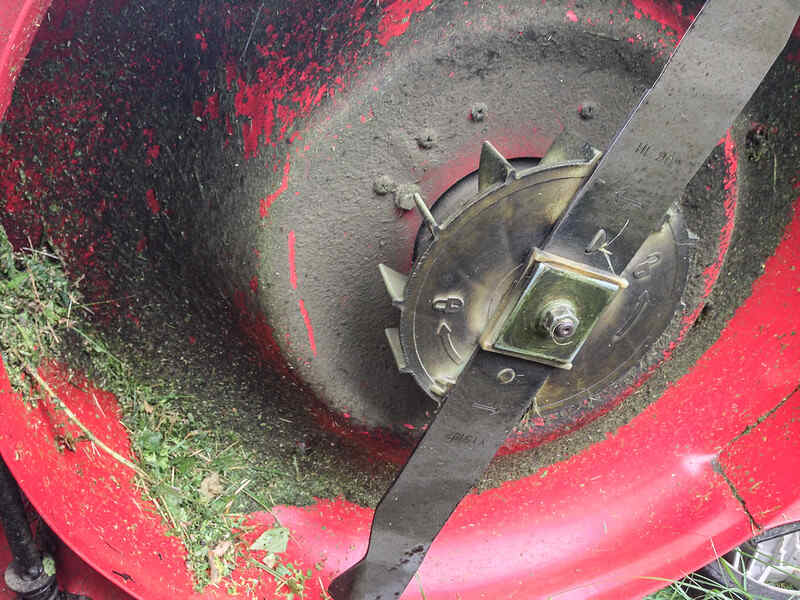
Photo Credit: Tony Webster / Flickr / CC BY 2.0
To promote healthy root growth and shade out weeds, raise the height of your mower blades and cut the grass taller. Keep the grass trimmings on the lawn since they serve as an organic mulch and add nutrients to the grass. Taller grass needs less water, which is critical for water conservation.
Watering Deeply
To promote healthy root development, water deeply but less frequently. This forces your grass’s roots to grow deep into the ground to reach the water, which makes your lawn more drought-tolerant. Drought-tolerant lawns use less water.
Integrated Pest Management
Use an Integrated Pest Management strategy, which emphasizes avoiding pest problems rather than eliminating them with harmful pesticides. To prevent lawn pests naturally, keep your lawn free of dead leaves, excessive thatch, and other organic matter. It’s also a good idea to attract predatory insects, birds, and other natural predators which feed on those pests.
Organic Weed Management
Focus on maintaining a weed-free lawn by regularly watering and mowing at the correct height. Reduce the need for chemical herbicides by pulling weeds by hand or making your own eco-friendly homemade weed killer.
FAQ About Organic Lawn Fertilizer
Is organic lawn fertilizer more costly than synthetic fertilizer?
Organic lawn fertilizers may have an upfront price greater than synthetic fertilizers. However, when the long-term benefits of healthy soil, lower environmental impact, and healthier grass growth are considered, investing in organic lawn care can result in cost savings over time.
Is organic lawn fertilizer suitable for all types of grass?
Yes, organic lawn fertilizer is suitable for all varieties of grass. Organic fertilizers are available to suit the unique nutrient requirements of both cool-season and warm-season grasses. Simply choose the proper organic fertilizer formulation for your grass type and apply it in the prescribed amounts.
Can I make organic lawn fertilizer at home?
You can make your own natural lawn fertilizer from regular household items and natural ingredients. Kitchen waste, grass clippings, and mulched leaves can all be composted to create nutrient-rich fertilizer for your lawn. You may also produce compost tea by steeping compost in water and use it as a liquid fertilizer.
Have a Healthy, Eco-friendly Lawn
Most homeowners these days are environmental enthusiasts–it’s necessary in a world of climate change and spiking pollution. More and more people want to eliminate chemical-based products like synthetic fertilizers from their lawn care regimen to support their local ecosystem.
Organic fertilizers are an important part of any eco-friendly lawn care routine. If you’re one of these newfound eco-warrior lawn enthusiasts, learning everything you can about organic lawn fertilizer is a good first step.
If you find it challenging to schedule fertilizer applications properly or need clarification about picking the right organic fertilizer for your lawn, don’t worry. You can always turn lawn fertilization over to the pros. Find a local lawn care pro who specializes in “green” lawn care on WikiLawn today.
Main Photo Credit: Elena Photo / Canva Pro / License